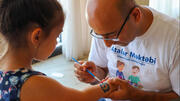-
Country Pages
-
Asia & the Pacific
- Afghanistan
- Bangladesh
- Bhutan
- Cambodia
- China
- India
- Indonesia
- Iran, Islamic Republic of
- Lao People's Democratic Republic
- Malaysia
- Maldives
- Mongolia
- Myanmar
- Nepal
- Pakistan
- Papua New Guinea
- Philippines
- Sri Lanka
- Thailand
- Timor-Leste
- Viet Nam
-
Eastern Europe & Central Asia
- Albania
- Armenia
- Azerbaijan
- Belarus
- Bosnia and Herzegovina
- Georgia
- Kazakhstan
- Kosovo Office
- Kyrgyzstan
- Moldova, Republic of
- North Macedonia
- Serbia
- Tajikistan
- Türkiye
- Turkmenistan
- Ukraine
- Uzbekistan
-
Arab States
- Algeria
- Djibouti
- Egypt
- Iraq
- Jordan
- Lebanon
- Libya
- Morocco
- Oman
- Palestine
- Somalia
- Sudan
- Syrian Arab Republic
- Tunisia
- Yemen
-
East & Southern Africa
- Angola
- Botswana
- Burundi
- Comoros
- Congo, the Democratic Republic of the
- Eritrea
- Eswatini
- Ethiopia
- Kenya
- Lesotho
- Madagascar
- Malawi
- Mauritius
- Mozambique
- Namibia
- Rwanda
- Seychelles
- South Africa
- South Sudan
- Tanzania, United Republic of
- Uganda
- Zambia
- Zimbabwe
-
Latin America & the Caribbean
- Argentina
- Bolivia, Plurinational State of
- Brazil
- Chile
- Colombia
- Costa Rica
- Cuba
- Dominican Republic
- Ecuador
- El Salvador
- Guatemala
- Haiti
- Honduras
- Mexico
- Nicaragua
- Panama
- Paraguay
- Peru
- Uruguay
- Venezuela, Bolivarian Republic of
- Caribbean (multi-country)
-
West & Central Africa
- Benin
- Burkina Faso
- Cabo Verde
- Cameroon
- Central African Republic
- Chad
- Congo
- Côte d'Ivoire
- Equatorial Guinea
- Gabon
- Gambia
- Ghana
- Guinea
- Guinea-Bissau
- Liberia
- Mali
- Mauritania
- Niger
- Nigeria
- Sao Tome and Principe
- Senegal
- Sierra Leone
- Togo
-

UNFPA Azerbaijan
Poverty in the Republic of Azerbaijan has dropped sharply, and it has made continued progress in increasing the use of contraceptives and reducing abortions. UNFPA has provided assistance since 1994, helping the Government to incorporate population issues into national development goals. Programmes aim at further broadening access to reproductive health services and improving their quality. They support updating policies and laws to strengthen women’s roles in politics, the economy, and all aspects of social life, including through community mobilization and engagement with authorities and civil society.
Population
- Population aged 0-14
- Population aged 15-64
- Population aged 65+
Sexual and reproductive health
- Births attended by skilled health personnel
Family Planning
- Modern method
Education
Gender, Rights, and Human Capital
Harmful Practices
News
How UNFPA is engaging men and boys to shift damaging attitudes and further gender equality
BAKU, Azerbaijan/BAC GIANG, Viet Nam – For many people, finding out their baby’s birth sex is a cause for celebration…
Girls in Azerbaijan battle disability stigma with sports
Life is often isolating for young people like Maryam. Girls living with disabilities often have few opportunities to…

